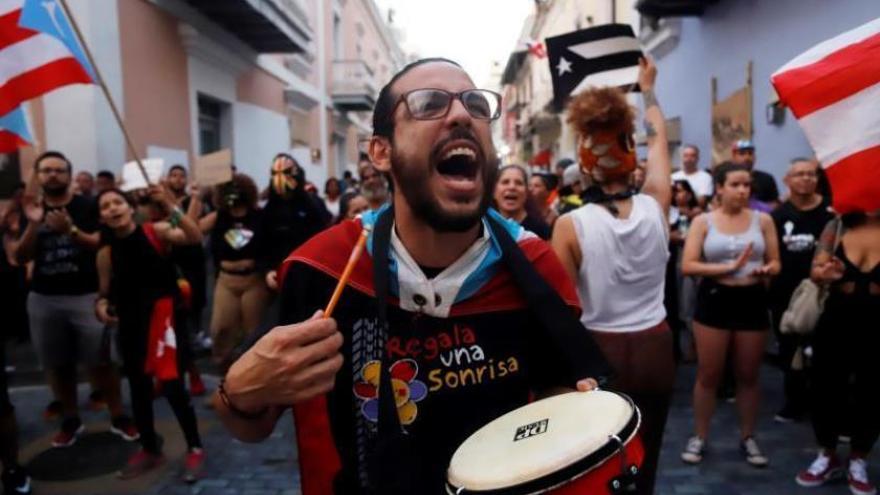
![]() 14ymedio, Carlos A. Montaner, Miami | 28 July 2019 — It was an unusual spectacle. Popular demonstrations forced the resignation of Ricardo Rosselló, governor of Puerto Rico. It was the first time that something like this had happened since 1898, when the United States snatched sovereignty of the Island from Spain in what became known as the Spanish-American or Spanish-Cuban-American War.
14ymedio, Carlos A. Montaner, Miami | 28 July 2019 — It was an unusual spectacle. Popular demonstrations forced the resignation of Ricardo Rosselló, governor of Puerto Rico. It was the first time that something like this had happened since 1898, when the United States snatched sovereignty of the Island from Spain in what became known as the Spanish-American or Spanish-Cuban-American War.
However, the central nucleus of the conflict remains intact. Apparently, the reasons for this episode have to do with the corruption of the government and the disclosure of a vulgar chat in which Rosselló and some twenty buddies and officials make offensive comments about political adversaries, or major artists, like Ricky Martin, but that’s not the whole truth.
That’s the surface. Underneath, like a ghost of the 19th century, lies the problem of status: independence, autonomy, or full statehood. Faced with the glaring insensitivity and stupidity of Rosselló and his courtiers, those in favor of independence or autonomy, the “populares” went out to the streets. They were right to be indignant, but the almost 900 pages of chat were anecdotal. They turned out to be a magnificent alibi. The hidden key of the protest was status.
I know the Island very well. I lived there from 1966 to 1970. I taught in a private university and our son was born there. It’s a beautiful and very dear place. It’s true that more than half a century has passed, but nothing has changed in the political order since 1898, except the proportions of the three trends.
Half a century ago the supporters of independence were 5% of the electoral register. Supporters of autonomy (or “free staters”) were, more or less, 60%, and those who wished to transform the Island into state number 51 of the American Union were at somewhere around 35%.
Today it seems that support for independence continues to be at 5% of voters, while the rest of the population is divided in similar proportions between supporters of autonomy and statehood. Sometimes the “populares” and sometimes the “staters” win. Fifty years ago only the autonomists would have won.
Wilfredo Braschi, a magnificent writer, extremely intelligent, friend of Luis Muñoz Marín, caudillo of autonomy, warned me of this with a certain melancholy: “The trend is unstoppable. The number of supporters of statehood will be more and more.”
The definitive blow against supporters of Puerto Rican independence was dealt by the United States Congress. In 1917, it granted American citizenship to all Puerto Ricans born or yet to be born on the Island. That allowed them to settle in “continental territory” without limits. Today there are more than 5 million in the United States and barely 3.3 million in Puerto Rico. (Florida is the state with the greatest number of Puerto Ricans: more than a million.)
The stability of the Island, democracy, republican institutions, American citizenship, which very few Puerto Ricans are prepared to renounce, individual freedoms, and, ultimately, the links with the United States, mean that Puerto Ricans have a per capita of forty thousand dollars annually, placing them at the head of Latin America, although they are at the tail of the United States.
Simultaneously, there is no extreme poverty, nor children that go hungry, lack schooling or medical attention. There is even the paradox that life expectancy in Puerto Rico (some 81 years) is higher than that of the United States. The same thing happens in post-secondary education: 47.1% of Puerto Ricans participate in it. Although it’s true that the average of the United States is 47.6%, Puerto Ricans surpass 20 of the 50 states in the Union.
None of these objective facts negates the immense problems of Puerto Rican society: drug use, violence related to that scourge, the enormous external debt, or the proportionally gigantic size of its public sector, but, as they say on the Island, nothing that doesn’t allow them to adequately deal with those conflicts.
What will happen, ultimately, from the resignation of Rosselló? Nothing. Everything will continue the same until, in many years, the number of staters clearly overtakes the autonomists and they decidedly ask for incorporation into the United States. That is the observable trend. Wilfredo Braschi, with melancholy, warned me about it.
Translated by: Sheilagh Herrera
_____________________
The 14ymedio team is committed to serious journalism that reflects the reality of deep Cuba. Thank you for joining us on this long road. We invite you to continue supporting us, but this time by becoming a member of 14ymedio. Together we can continue to transform journalism in Cuba.
